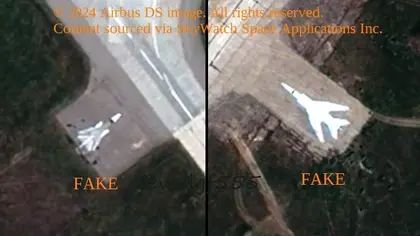While analysing satellite images, Evergreen Intel, an OSINT researcher, discovered that Russians have allegedly created silhouettes of fake Tu-22M3 and Su-24M/MR aircraft at the Russian Mozdok airbase in North Ossetia-Alania.
As observed from Airbus Pleiades 0.5m resolution imagery at 08:13 UTC on April 22nd, 2024, four Su-24M/MR strike aircraft, six Tu-22M3 strategic bombers and 20 military helicopters were also visible.
JOIN US ON TELEGRAM
Follow our coverage of the war on the @Kyivpost_official.
The presence of painted fake aircraft at Mozdok is not new, although new Su-24 artwork has been spotted, as clarified by the OSINT researcher. Reports of painted fake Tu-22s at Mozdok first emerged in January 2024.
On Jan. 11, satellite images published by OSINT analyst MT Anderson on his X account revealed that the Russians had painted at least one dummy target resembling a Tu-22M3. Additionally, the images captured two MiG-31 aircraft at the Mozdok airfield, along with at least three Tu-22M3 bombers.

Russia Imposes Forced Enlistment in Occupied Ukraine Contrary to International Law
“Noticeable differences are the increase in the helicopter numbers, the addition of a Su-24M/MR detachment (from Saky?), and the absence of heavy transports,” the report read.
Reasons behind the painted Russian aircraft
In January, Brady Africk, an analyst at the Department of Foreign and Defense Policy Research at the American Enterprise Institute, reported that the Russians had escalated the deployment of decoy combat aircraft at air bases accessible to Ukrainian drones.
Satellite images released by Africk showed several “decoys” painted at air bases once beyond Kyiv’s reach, including Engels-2, Mozdok, Russian bases in Crimea, and Primorsko-Akhtarsk, and Yeysk in the Krasnodar Krai.
According to Africk, these decoys were designed to confuse Ukrainian drones, which rely on basic cameras to identify aircraft shapes.
Ukrainian aviation expert Valery Romanenko confirmed in an interview with Radio NV that distinguishing a real plane from a painted one in satellite images is challenging.
However, Romanenko disclosed that Ukraine’s allies, equipped with side-viewing radar equipment over the Black Sea, can differentiate between real and painted aircraft.
How many Tu-22M3s can Mozdok airfield accommodate?
Satellite images indicate that Mozdok airbase is hosting at least six bombers, despite losing a Tu-22M3 on April 19.
“The TU-22M bombers are not new. They have been observed in quantities of 6-7 since June of last year at Mozdok,” the message said.
However, the Ukrainian media outlet Defense Express highlighted the significance of the observed number of Tu bombers.
On April 19, the Defense Forces of Ukraine shot down one Tu-22M3, likely flown from Mozdok airfield.
Considering that the Russian Aerospace Forces possess only 30 Tu-22M3 bombers, concentrating at least one-fifth of the fleet at a single airfield is noteworthy.
The Russians began utilizing Mozdok airfield as a base for their Tu-22M3s deployed for strikes against Ukraine by the end of May last year.
Previously, the airfield underwent renovation starting in 2020. Until 1992, Mozdok served as a base for Tu-95MS, and in 2016, the Russians utilized Tu-22M3s from this airfield for strikes in Syria.
According to the report from OSINT researcher RedIntelPanda, Russia has initiated the construction of a new military airfield near the village of Alexeyevka in the Belgorod region.
Sentinel Hub measurements indicate that the runway length is approximately 1800 meters (6,000 feet). Although not expansive, the OSINT researcher noted that it can support various aircraft types.
The researcher speculated that, given the military nature of this airfield, it may serve as a fallback location for Russian helicopters to operate from. However, he also suggested that the airfield's utility may extend beyond helicopters. He stated, “This runway could support fixed-wing aircraft such as light transports and VIP (An-26, An-72) and even Su-25 [NATO: Frogfoot] [ground] attack jets.”
You can also highlight the text and press Ctrl + Enter












